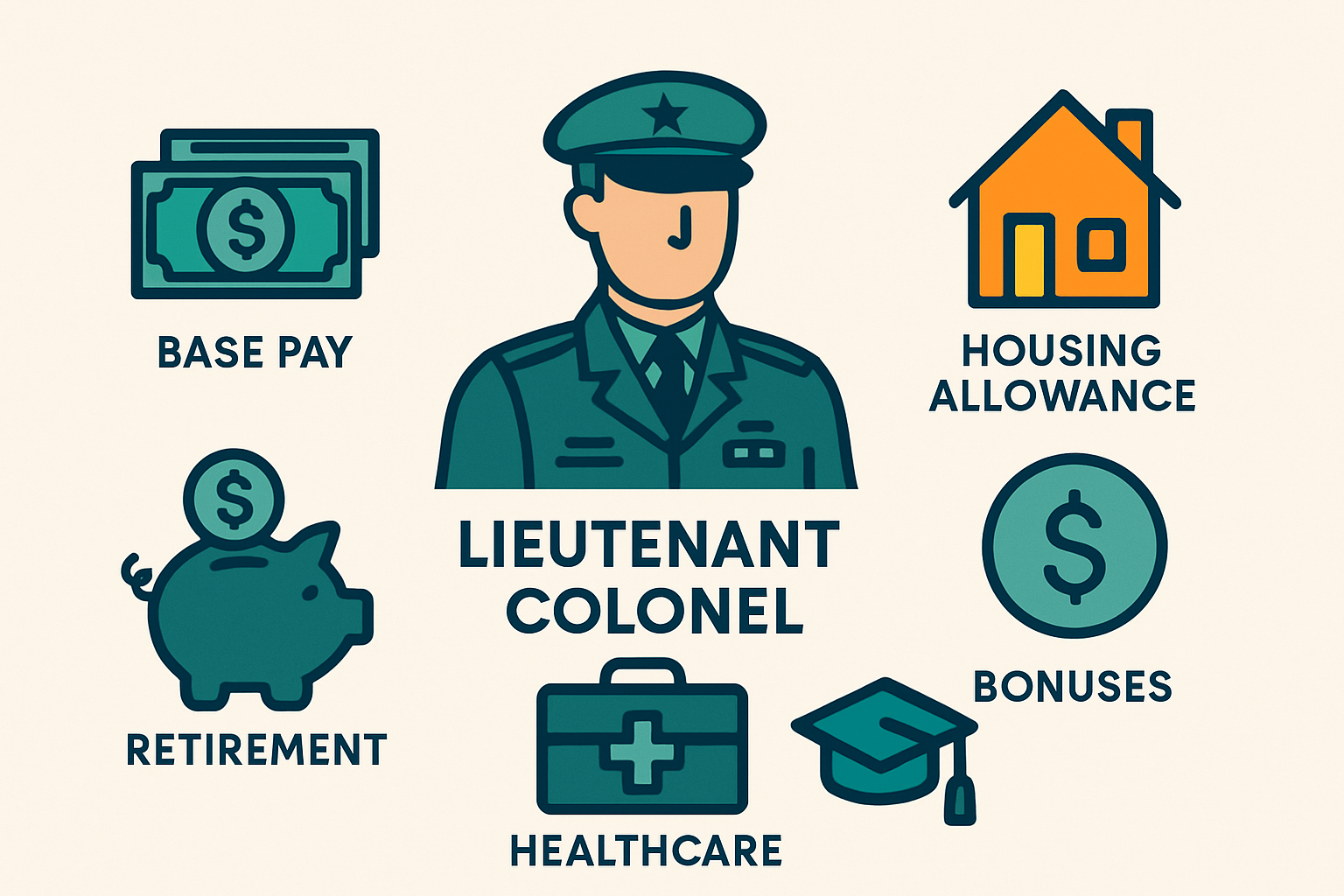How Much Does a Lieutenant Colonel Earn Each Year?

Lieutenant Colonel is a key rank in the U.S. military hierarchy. Nestled right above Major and just below Colonel, people with this rank typically lead battalions or squadrons and carry a hefty load of leadership and strategic responsibilities.
Understanding the Rank and What a Lieutenant Colonel Does
A Lieutenant Colonel is a seasoned field-grade officer who usually takes the helm of battalion-sized units that include about 300 to 1,200 soldiers or their equivalent.
How Much Does a Lieutenant Colonel Typically Earn Annually? Let’s Take a Closer Look at the Base Salary
A Lieutenant Colonel's base salary mostly hinges on their years of service and their specific pay grade (O-5) as well as adjustments set by the Department of Defense. Usually base pay creeps up bit by bit as time goes on, rewarding the experience they rack up along the way. For 2024 you can generally expect a Lieutenant Colonel’s base salary to land somewhere between about $81,000 and $117,000 a year depending on how long they have been in the game.
| Years of Service | Base Monthly Pay | Annual Base Pay |
|---|---|---|
| Less than 2 | $6,746.40 | $80,956.80 |
| 2 to 3 | $6,972.90 | $83,674.80 |
| 4 to 6 | $7,463.10 | $89,557.20 |
| 6 to 8 | $7,825.80 | $93,909.60 |
| 8 to 10 | $8,277.60 | $99,331.20 |
| 10+ | $9,740.40 | $116,884.80 |
These figures come straight from the 2024 military pay charts for O-5 ranks—your standard numbers, nothing fancy but steady as she goes.
Additional Earnings, Including Those Nice Little Bonuses, Allowances, and Incentives That Sweeten the Deal
Lieutenant Colonels often receive a handful of extra payments on top of their base salary. These bonuses acknowledge the tough realities of military life like uprooting to new places, tackling risky assignments and being away from family.
- Basic Allowance for Housing (BAH) helps with housing costs whether you’re bunking on base or settling off-post. It shifts depending on where you’re stationed and your family situation because no two homes are alike.
- Basic Allowance for Subsistence (BAS) chips in toward meal expenses reflecting the military's effort to make sure troops don’t have to go hungry while they’re out there doing their thing.
- Special and Incentive Pays are like little high-fives in dollar form rewarding specific skills or duties such as flight pay, hazardous duty pay or handy retention bonuses that keep individuals sticking around.
- Family Separation Allowance steps up when service members are away from their loved ones due to deployment or official orders. It offers a bit of compensation for those tough stretches apart.
- Overseas Pay tosses in extra support for those stationed abroad to help ease the extra costs or curveballs that come with life in foreign digs.
A Closer Look at Lieutenant Colonel Pay Across Military Branches
Lieutenant Colonels in the Army, Air Force, Marine Corps, Coast Guard and Space Force generally line up closely when it comes to base pay due to the federal pay scale. The devil's in the details with allowances and incentives because they can shift greatly depending on the branch and specific roles or deployment schedules or operational needs.
| Branch | Average Base Pay (Annual) | Common Allowances Included | Estimated Total Compensation |
|---|---|---|---|
| Army | $100,000 | BAH, BAS, Deployment Pay | $115,000 - $130,000 |
| Air Force | $102,000 | BAH, BAS, Flight Pay | $117,000 - $135,000 |
| Marine Corps | $100,000 | BAH, BAS, Hazard Pay | $113,000 - $130,000 |
| Coast Guard | $99,000 | BAH, BAS, Sea Pay | $112,000 - $128,000 |
| Space Force | $103,000 | BAH, BAS, Special Duty Pay | $118,000 - $136,000 |
These numbers are ballpark figures based on publicly available military pay data as of 2024 — a solid snapshot, though actual pay can wiggle a bit depending on the details.
How Experience and Location Affect Earnings
Experience demonstrated through years of service and time spent as a Lieutenant Colonel clearly influences the base pay scale. Officers who have been around the block a bit longer generally take home higher base salaries that recognize their seniority. Geographic location also weighs in significantly, since pay allowances shift to match local living costs and the nature of the work environment.
Cost-of-Living Adjustments COLA are a key part of military pay designed to help offset those pesky higher expenses service members often run into when stationed overseas or in pricier spots. The amount of overseas COLA can really swing depending on the local cost index, meaning a little extra cash shows up each month to ease the pinch. Deployments in hazardous or remote locations usually qualify officers for special pays on top of that. These geographic and situational pay tweaks can bump up take-home earnings by thousands each year.
Benefits Beyond Base Pay That Go the Extra Mile, Including Retirement and Health Care
Lieutenant Colonels enjoy a benefits package that truly adds serious weight to their overall pay. These financial perks usually include a solid military retirement plan that offers meaningful pension benefits and access to extensive healthcare coverage through Tricare to reduce medical costs. On top of that, there are education benefits like the GI Bill to support ongoing learning or ease family education expenses.
- A military retirement plan typically offers 50% or more of your base pay after 20 years of service. It can provide a comforting sense of financial stability down the road.
- Tricare health insurance helps officers and their families get affordable medical care across a broad range of services. It makes unexpected doctor visits less daunting.
- Education assistance programs like the GI Bill help with college tuition, vocational training or advanced degrees. This is a genuine boost for anyone investing in their future.
- Paid vacation and sick leave let officers take time off for rest or personal care without losing income because sometimes life demands a breather.
- Family support programs cover counseling, childcare, and help with spouse employment. They provide the whole family a solid support system when needed most.

Common Misunderstandings That Often Surround Lieutenant Colonel Salaries
Some common misconceptions about Lieutenant Colonel pay include the notion that all officers earn the same paycheck regardless of rank or that benefits barely affect pay compared to base salary. Pay can vary quite a bit depending on rank, years of service and duty assignments.
"When you take a closer look at military earnings, it’s really about the entire compensation package, not just the base salary staring back at you. Base pay, allowances, bonuses, and benefits all chip in together to paint a much clearer—and might I say, friendlier—financial picture than just that monthly paycheck alone."
Understanding How to Estimate Your Potential Earnings as a Lieutenant Colonel A Handy Guide
Get a solid estimate of your potential yearly earnings as a Lieutenant Colonel by checking the base pay that corresponds to your years of service on the official military pay chart. Next up, factor in your allowances like BAH and BAS—these can vary depending on where you are stationed and whether you have dependents tagging along. Don’t forget to toss in any special or incentive pays tied to your specific role and location, such as hazard or overseas pay—those can really add up. Finally, round things out by including any extra bonuses or family support allowances you might be eligible for.
Career Outlook Stepping Up from Lieutenant Colonel and What Lies Ahead
Officers who serve as Lieutenant Colonels often find themselves stepping up to Colonel and sometimes even climbing into the rarer territory of general officer ranks. Each promotion brings a bigger slice of responsibility and a sweeter paycheck. These career leaps are usually competitive and depend on solid performance, strong leadership skills and openings at the right time.





